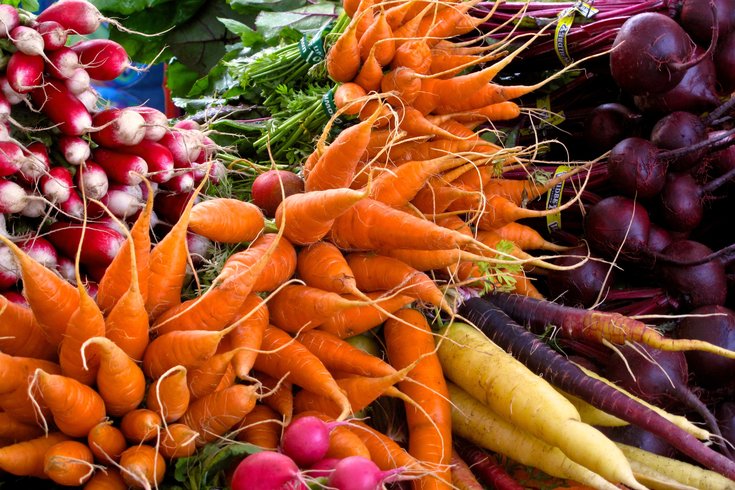
June 26, 2017
 Dean Fosdick/AP
Dean Fosdick/AP
Philadelphia is listed as one of the 10 American cities most obsessed with eating organic food.
It is crucial for all of us to understand that what we put in our bodies
affects much more than our outward physical appearance. In fact, in recent
years, even medical professionals are adamant that what we eat can have a
significant impact on disease outcomes and our overall health.
Regularly consuming foods that are known to cause chronic inflammation has been linked to the onset and acceleration of major illnesses including cancer, Alzheimer’s, heart diseases, diabetes and depression. Conversely, consuming foods with anti-inflammatory properties can aid in the prevention and intervention of such diseases.
"Many experimental studies have shown that components of foods or beverages may have anti-inflammatory effects," says Dr. Frank Hu, professor of nutrition and epidemiology in the Department of Nutrition at the Harvard School of Public Health.
Below you will find a list of foods that cause inflammation and foods that decrease inflammation. It is important to be mindful of how you feed your
body day in and day out. Just like you would care for your car to keep it
running better and longer, you must think of your body as a well-oiled
machine that needs to be maintained in the same way to avoid breaking down.
• Red meat – Many meat products contain high amounts of saturated fat, and epidemiological studies suggest that diets rich in this type of fat tend to promote inflammation.
• Fried foods – Fried and processed foods such as French fries, chicken fingers, mozzarella sticks, and onion rings contain high levels of inflammatory advanced glycation end products (AGEs), compounds that form when products are cooked at high temperatures, pasteurized, dried, smoked, fried, or grilled. Researchers from the Mount Sinai School of Medicine found that when people cut out processed and fried foods that have high levels of AGEs, markers of inflammation in their body diminished.
• Refined carbohydrates – White flour and products with high glycemic indexes such as pizza, pasta, crackers, cookies, can cause blood sugar levels to spike and trigger the body’s inflammatory response. High glycemic diets also have been linked with increased blood levels of C-reactive protein, an inflammatory marker associated with heart disease.
• Soda & sugar – The American Journal of Clinical Nutrition warns that processed sugars found in sodas, sweet treats, and sugary beverages trigger the release of inflammatory messengers called cytokines. Sugar goes by many names so look out for any word ending in “ose” – e.g., fructose or sucrose on ingredient labels.
• Olive oil - Olive oil contains a natural anti-inflammatory agent and may be partly responsible for the low levels of heart disease among those following a Mediterranean diet. Use olive oil on salads and when you cook instead of butter or vegetable oil.
• Dark leafy greens – Vitamin E may be key in protecting the body against pro-inflammatory molecules called cytokines. One of the best sources of this vitamin is in dark green vegetables such as spinach, Swiss chard, kale and broccoli.
• Whole grains – To maximize nutrition while minimizing inflammation, stick to whole grains such as barley, quinoa, rye, or brown rice when you shop or cook. Many of these grains are also gluten-free but be sure to check labels if you have celiac disease or a gluten intolerance.
• Fatty fish - Oily fish, like salmon, mackerel, tuna and sardines, are high in omega-3 fatty acids, which have been shown to help reduce inflammation. To get the benefits, however, you need to eat fish several times a week, and it should be cooked in healthy ways.
• Nuts - Another source of inflammation-fighting healthy fats is nuts — particularly almonds, which are rich in fiber, calcium and vitamin E, and walnuts, which have high amounts of alpha-linolenic acid, a type of omega-3 fat. All nuts, though, are packed with antioxidants, which can help your body fight off and repair the damage caused by inflammation.
• Other fruits & vegetables – Fruits and vegetables in general are rich in antioxidants, such as flavonoids, carotenoids and vitamins A, C and E. These antioxidants help reduce inflammation. The more brightly colored the fruit or vegetable, the richer it is likely to be in these beneficial substances. Good choices include spinach, berries, carrots and broccoli. Eat all different colors of fruits and vegetables, preferably organic and either fresh or frozen rather than canned, for the most benefits. Different colors indicate different nutrients.
For more information about the anti-inflammatory diet, Dr. Andrew Weil considered to be the father of integrative medicine, speaks volumes on the subject. His anti-inflammatory food pyamid illustrates in more detail the way he suggests we all eat for graceful aging and vibrant longevity.
• • •
I hope you find this information as helpful as I have. Please feel free to share your stories here. I will continue to keep you posted on my health journey. Follow me for updates @christiemandia.